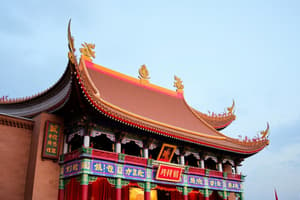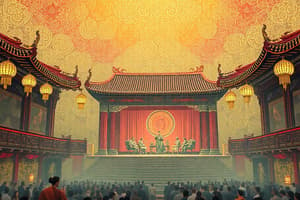Podcast
Questions and Answers
What role did shamans play in early Chinese theatre during the Shang dynasty?
What role did shamans play in early Chinese theatre during the Shang dynasty?
- They acted as playwrights for royal courts.
- They offered rain dances and shamanistic performances. (correct)
- They were the first to create musical compositions.
- They performed plays reflecting historical events.
Which dynasty is associated with the earliest records of professional entertainers, including actors?
Which dynasty is associated with the earliest records of professional entertainers, including actors?
- Tang dynasty
- Han dynasty
- Zhou dynasty (correct)
- Shang dynasty
What was the significance of You Meng or Jester Meng in early Chinese theatre?
What was the significance of You Meng or Jester Meng in early Chinese theatre?
- He was the first to perform a tragedy.
- He improvised comedy without rehearsals.
- He used imitation to gain favor from King Zhuang. (correct)
- He composed the earliest known lyrics for court dances.
What does the Great Warrior Dance symbolize as explained by Confucius?
What does the Great Warrior Dance symbolize as explained by Confucius?
What type of performance gained popularity during the Han dynasty under Emperor Wu?
What type of performance gained popularity during the Han dynasty under Emperor Wu?
What evidence suggests that elements of music and costumes were present in early performances?
What evidence suggests that elements of music and costumes were present in early performances?
Which aspect of the Great Warrior Dance conveys the idea of waiting for rulers?
Which aspect of the Great Warrior Dance conveys the idea of waiting for rulers?
What type of entertainment does the term 'Hundred Shows' refer to during the Han dynasty?
What type of entertainment does the term 'Hundred Shows' refer to during the Han dynasty?
Flashcards
Early Chinese Theatre
Early Chinese Theatre
A form of Chinese theatre that dates back to the Shang dynasty (16th century BC?–c. 1046 BC).
Shamanistic Performances in Zhou
Shamanistic Performances in Zhou
Shamanistic rituals involving music and costumes performed during the Zhou dynasty (c. 1046 BC – 256 BC).
Court Entertainers in Zhou Dynasty
Court Entertainers in Zhou Dynasty
Professional entertainers who included dancers, musicians, and actors employed by the Zhou royal court and various ancient states.
Who was You Meng (Jester Meng)?
Who was You Meng (Jester Meng)?
Signup and view all the flashcards
The Great Warrior Dance (Dawu Dance)
The Great Warrior Dance (Dawu Dance)
Signup and view all the flashcards
Symbolism in the Great Warrior Dance
Symbolism in the Great Warrior Dance
Signup and view all the flashcards
Horn-Butting Show (Jiǎodǐxì)
Horn-Butting Show (Jiǎodǐxì)
Signup and view all the flashcards
The 'Hundred Shows' (Bǎixì)
The 'Hundred Shows' (Bǎixì)
Signup and view all the flashcards
Study Notes
Early Chinese Theatre
- Origins traced to the Shang dynasty (16th century BC – c. 1046 BC), with shamanistic dances and songs recorded.
- Zhou dynasty (c. 1046 BC – 256 BC) saw professional entertainers emerging, including dancers, musicians, and actors. These earliest actors were likely clowns.
- Evidence suggests court performances existed that mirrored shamanistic practices, with music and costumes.
- Famous actor You Meng (or Jester Meng) was a giant, and his performance highlighted the ability of entertainment to influence rulers.
Early Drama and Storytelling
- The Great Warrior Dance (Dawu Dance) from the Zhou dynasty was a significant performance.
- The dance, discussed by Confucius, depicted the overthrow of the Shang dynasty by King Wu and the foundation of the Zhou.
- The dance used symbolism to portray military might, success, and the waiting for other leaders.
The Han Dynasty (206 BC – 220 AD)
- The Horn-Butting Show (Jiǎodǐxì), a wrestling show, flourished and was among the "Hundred Shows" during the Han dynasty.
- The Horn-Butting Show, likely also a spectator sport, shows evidence of performers acting out defined roles and plotlines based on stories like the battle between a tiger and a magician.
- Murals from aristocratic tombs like the one in Dahuting, Xinmi, Henan, confirm the presence of performers entertaining at banquets.
Studying That Suits You
Use AI to generate personalized quizzes and flashcards to suit your learning preferences.





